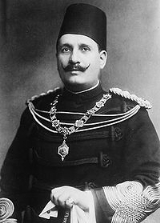
King of Egypt
Encyclopedia
King of Egypt was the title used by the ruler of Egypt
between 1922 and 1951. When the United Kingdom
ended its protectorate over Egypt on 28 February 1922, Egypt's Sultan
Fouad I
issued a decree on 15 March 1922 whereby he adopted the title of King of Egypt. It has been reported that the title change was due not only to Egypt's newly independent status, but also to Fouad I's desire to be accorded the same title as the newly installed rulers of the newly created kingdoms of Hejaz
, Syria
and Iraq
. The only other monarch to be styled King of Egypt was Fouad I's son Farouk I
, whose title was changed to King of Egypt and the Sudan
in October 1951 following the Wafdist
government's unilateral abrogation of the Anglo-Egyptian Treaty of 1936
. Although the rulers of Ancient Egypt
are commonly referred to as Kings of Egypt, it is more correct to refer to them as Pharaoh
s.
Egypt
Egypt , officially the Arab Republic of Egypt, Arabic: , is a country mainly in North Africa, with the Sinai Peninsula forming a land bridge in Southwest Asia. Egypt is thus a transcontinental country, and a major power in Africa, the Mediterranean Basin, the Middle East and the Muslim world...
between 1922 and 1951. When the United Kingdom
United Kingdom of Great Britain and Ireland
The United Kingdom of Great Britain and Ireland was the formal name of the United Kingdom during the period when what is now the Republic of Ireland formed a part of it....
ended its protectorate over Egypt on 28 February 1922, Egypt's Sultan
Sultan of Egypt
Sultan of Egypt was the status held by the rulers of Egypt after the establishment of the Ayyubid Dynasty of Saladin in 1174 until the Ottoman conquest of Egypt in 1517. Though the extent of the Egyptian Sultanate ebbed and flowed, it generally included Sham and Hejaz, with the consequence that the...
Fouad I
Fuad I of Egypt
Fuad I was the Sultan and later King of Egypt and Sudan, Sovereign of Nubia, Kordofan, and Darfur. The ninth ruler of Egypt and Sudan from the Muhammad Ali Dynasty, he became Sultan of Egypt and Sudan in 1917, succeeding his elder brother Sultan Hussein Kamel...
issued a decree on 15 March 1922 whereby he adopted the title of King of Egypt. It has been reported that the title change was due not only to Egypt's newly independent status, but also to Fouad I's desire to be accorded the same title as the newly installed rulers of the newly created kingdoms of Hejaz
Kingdom of Hejaz
The Kingdom of Hejaz was a state in the Hejaz region, ruled by the Hashemite family. The kingdom was annexed by Nejd and merged into the Kingdom of Nejd and Hejaz in the mid 1920s, which would eventually be known as Saudi Arabia in 1932.-Kings of Hejaz:...
, Syria
King of Syria
The title King of Syria, was established briefly following the partitioning of the Ottoman Empire in the aftermath of World War I. Faysal ibn Husayn of the House of Hashim was proclaimed King of Greater Syria on 7 March 1920 in Damascus, following the Arab revolt against the Ottomans of 1916–1918...
and Iraq
Kingdom of Iraq
The Kingdom of Iraq was the sovereign state of Iraq during and after the British Mandate of Mesopotamia. The League of Nations mandate started in 1920. The kingdom began in August 1921 with the coronation of Faisal bin al-Hussein bin Ali al-Hashemi as King Faisal I...
. The only other monarch to be styled King of Egypt was Fouad I's son Farouk I
Farouk of Egypt
Farouk I of Egypt , was the tenth ruler from the Muhammad Ali Dynasty and the penultimate King of Egypt and Sudan, succeeding his father, Fuad I, in 1936....
, whose title was changed to King of Egypt and the Sudan
King of Egypt and the Sudan
King of Egypt and the Sudan was the title used by the Egyptian monarch from 16 October 1951 until the abolition of the monarchy on 18 June 1953....
in October 1951 following the Wafdist
Wafd Party
The Wafd Party was a nationalist liberal political party in Egypt. It was said to be Egypt's most popular and influential political party for a period in the 1920s and 30s...
government's unilateral abrogation of the Anglo-Egyptian Treaty of 1936
Anglo-Egyptian Treaty of 1936
The Anglo-Egyptian Treaty of 1936 was a treaty signed between the United Kingdom and the Kingdom of Egypt; it is officially known as The Treaty of Alliance Between His Majesty, in Respect of the United Kingdom, and His Majesty, the King of Egypt...
. Although the rulers of Ancient Egypt
Ancient Egypt
Ancient Egypt was an ancient civilization of Northeastern Africa, concentrated along the lower reaches of the Nile River in what is now the modern country of Egypt. Egyptian civilization coalesced around 3150 BC with the political unification of Upper and Lower Egypt under the first pharaoh...
are commonly referred to as Kings of Egypt, it is more correct to refer to them as Pharaoh
Pharaoh
Pharaoh is a title used in many modern discussions of the ancient Egyptian rulers of all periods. The title originates in the term "pr-aa" which means "great house" and describes the royal palace...
s.

